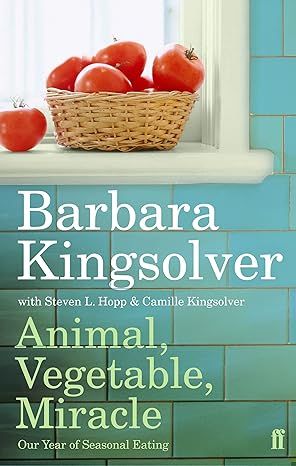Animal, Vegetable, Miracle: Our Year of Seasonal Eating
4.5 out of 5
2,496 global ratings
"We wanted to live in a place that could feed us: where rain falls, crops grow, and drinking water bubbles up right out of the ground."
Barbara Kingsolver opens her home to us, as she and her family attempt a year of eating only local food, much of it from their own garden. Inspired by the flavours and culinary arts of a local food culture, they explore many a farmers market and diversified organic farms at home and across the country. With characteristic warmth, Kingsolver shows us how to put food back at the centre of the political and family agenda. Animal, Vegetable, Miracle is part memoir, part journalistic investigation, and is full of original recipes that celebrate healthy eating, sustainability and the pleasures of good food.
384 pages,
Kindle
Audiobook
Hardcover
Paperback
Audio CD
First published December 31, 2007
ISBN 9780571233571
About the authors
Barbara Kingsolver
Barbara Kingsolver was born in 1955 and grew up in rural Kentucky. She earned degrees in biology from DePauw University and the University of Arizona, and has worked as a freelance writer and author since 1985. At various times she has lived in England, France, and the Canary Islands, and has worked in Europe, Africa, Asia, Mexico, and South America. She spent two decades in Tucson, Arizona, before moving to southwestern Virginia where she currently resides.
Her books, in order of publication, are: The Bean Trees (1988), Homeland (1989), Holding the Line: Women in the Great Arizona Mine Strike (1989), Animal Dreams (1990), Another America (1992), Pigs in Heaven (1993), High Tide in Tucson (1995), The Poisonwood Bible (1998), Prodigal Summer (2000), Small Wonder (2002), Last Stand: America's Virgin Lands, with photographer Annie Griffiths (2002), Animal, Vegetable, Miracle: A Year of Food Life (2007), The Lacuna (2009), Flight Behavior (2012), Unsheltered (2018), How To Fly (In 10,000 Easy Lessons) (2020), Demon Copperhead (2022), and coauthored with Lily Kingsolver, Coyote's Wild Home (2023). She served as editor for Best American Short Stories 2001.
Read more
Reviews
Kindle Customer
5
A memoir, a polemic, a sermon, and a call to locavorism
Reviewed in the United States on March 21, 2008
Verified Purchase
Review - Animal, Vegetable, Miracle: A Year of Food Life, by Barbara Kingsolver with Steven L. Hopp and Camille Kingsolver
This book is several things, a memoir, a polemic, a sermon, and a call to locavorism. On a small Virginia farm a family decides to experiment for one year eating mostly homegrown and locally-grown food. The cast is acclaimed writer Barbara Kingsolver, who gardens and writes the narrative, professor-husband Steven Hopp, who is allowed in the kitchen to bake bread and writes sidebar essays, late-teen daughter Camille, who writes observations, pertinent recipes and meal plans, and nine-year-old Lily, an earnest poultry entrepreneur.
Kingsolver is an accomplished writer of mostly novels and is an alert and delightful wordsmith. In this nonfiction work, her writing is entertaining but lacks discipline; she bounces from object to subject like a child with too many toys. A chapter titled Molly Mooching (a Molly is a morel mushroom) provides history on the farm Steven bought some years ago, delivers an apologia for tobacco farmers, offers Appalachian flora trivia, takes us on a hunt for morels, puts potatoes and other early plantings in the ground, expounds on onions, interjects an essay by Steven titled Is Bigger Really Better? and concludes with Camille who writes Getting It While You Can, a teen's perspective on her mother's food plan and a recipe for Asparagus and Morel Bread Pudding. All of which is fun, disconcerting, and marginally useful.
In addition to politics and sermons, twenty chapters take us through planning, planting, preparing, eating and preserving. Titles include Springing Forward, The Birds and the Bees, Growing Trust: Mid-June, Eating Neighborly: Late June, Zucchini Larceny: July, and Life in a Red State: August, a double-entendre of tomatoes and more politics. For dessert we accompany Barbara and Steven on a two-week second honeymoon in Italy.
This book is a teaser. It titillates the reader with the benefits of home gardening but provides few gardening details; it teases with the compelling concept of locavorism but lacks inspiring success stories. Worst, it is naïve. Experienced gardener-writers like Eliot Coleman, author of Four-Season Harvest, know and show how to keep a garden going year-round. Kingsolver apparently feels that the gardening world dies in autumn and does not reappear until asparagus pops up in spring.
Animal, Vegetable, Miracle is minimally useful as a reference book because, alas and inexplicably, there is no index. Thus, to remember the names of the six companies that control ninety-eight percent of the world's seeds, one must flip pages and hope for a lucky find. (It is in Chapter 3, titled Springing Forward.) You could write your own index. You could underline extensively and write key words at chapter beginnings. My messy alternative is to apply little sticky notes next to items I may wish to find again, so my copy now looks like a yellow-feathered flat bird.
Back matter includes a bibliography, a list of organizations, and sources for Steven's sidebar references. All of Camille's recipes may be found on the web site: [...] which has lots of photos. The site is a fun visit that puts a face on the people, the plants, and the animals.
I agree strongly with the locavore movement. The present food production system is a soil damaging, oil depleting, nutrition compromising scheme designed for corporate, not human health. For more on all that I recommend Michael Pollan's books: Omnivore's Dilemma, and, In Defense of Food.
Kingsolver has many fans so I hope that this book will create many converts to locavorism. But I'm skeptical, mindful of Steinbeck's admonition that, "No one wants advice, only corroboration." There is a plethora of advice in this book. But it will provide corroboration for those who are already concerned about the sad state of our food economy wherein any digestible item is supermarket available on every day of the year at great expenditure of oil and soil, at great reduction of flavor, at great loss to local communities and your checking account.
I have three pieces of advice for the Hoppsolvers (author construction): grow much more garlic, keep it in a cool place, not behind the kitchen stove, and, stop making your bread with flour that has been oxidizing since it was ground--grind wheat and other grains just before making your bread; it will be nutritionally superior and even more delicious.
In spite of being tossed from one subject to another time and again and learning almost nothing new about home food production, I enjoyed Kingsolver's range of interests and her entertaining writing. So here's a big thank you to all my homestead list friends who recommended that I read this book.
Read more
24 people found this helpful
lisan
5
Eat well and save our planet
Reviewed in the United States on January 20, 2024
Verified Purchase
I actually found my first copy of this book at Goodwill for $1. I love Barbara Kingsolver, so I grabbed it. Once I got home and started reading it, I could not put it down. She spent a year of her life trying to live off her land and/or eating locally grown food. The book was written a while ago, but it could have been written yesterday. She saw what was coming and changed her life accordingly. She has so many great and practical ideas for saving our planet while eating well. The book has seasonal recipes for the entire year. The ones I’ve tried so far are great! I now make my own pizza from scratch every Friday night. She got me interested in making my own cheeses, which led to another great book, Home Cheese Making by Ricki Carroll.
I gave my copy away and bought a new one for a Christmas gift. Now I have to buy a new one for myself.
Read more
Barb
5
Easy read, wonderful information and fun story!
Reviewed in the United States on February 10, 2024
Verified Purchase
When a book is hard to put down because it's so easy to read and so entertaining, why wouldn't you continue to enjoy the time with this story?
Cathe
5
I'm a locavore!
Reviewed in the United States on July 16, 2007
Verified Purchase
The more I read about the watering down of organic standards, the more I've been rethinking my food choices. It seems that most organic food is being produced by huge corporate farms and megacorporations. Those are not the industries I want to support with my food dollars. In the last year, I've been buying as much as possible from local farmers who may not be certified organic but who grow their crops using organic and sustainable methods. I feel I'm getting a better quality food and supporting my own community - and hopefully contributing less to global warming since my food doesn't have to travel miles to get to me.
So when I heard Barbara Kingsolver (one of my favorite authors) had a new book out and it was about eating locally, I knew I had to read it. And it did not disappoint.
Kingsolver and her family left their Arizona home to move to a farm in southern Appalachia. They no longer wanted to live in a state where virtually all the food and water was trucked in from somewhere else. They chose Virginia because (among other reasons) they wanted to live in a place that could feed them. A place "where rain falls, crops grow, and drinking water bubbles right up out of the ground."
After nearly a year of settling in, fixing up the house, and planting their gardens, they embarked on their one-year mission to eat only food they grew themselves or what was raised in their own neighborhood. Kingsolver takes us through the work of raising a garden that would feed them throughout the year. We see the work involved in weeding and caring for the plants, harvesting, and preserving them. This book is a great lesson on when various foods are in season (hard to know if you shop at supermarkets).
The family also raises laying hens, as well as chickens and turkeys for meat. Kingsolver and her family have for many years eaten only non-factory farmed meat and felt good about raising their own animals. They would give their animals "freedom on an open pasture that's unknown to conventionally raised poultry." Kingsolver also responded to a Slow Food USA campaign to bring back heritage turkeys. Unlike the conventional Broad-Breasted White Turkey commonly raised in industrial settings, the heritage turkeys can actually support their own weight and reproduce naturally. In addition, these birds retain more of their wild ancestors' sense about foraging, predator avoidance, and are more disease resistant.
Kingsolver's husband Steven L. Hopp's short essays provide information throughout the book on subjects such as the fossil fuel used to produce and ship our food, world hunger, genetically modified foods, family farms vs. industrial farms, industrial animal food production, paying the price for cheap, industrial-grown foods, the effectiveness of using pesticides and herbicides, mad cow disease, and much more. He provides resources to get more information as well as ways to take action. Kingsolver's college-aged daughter, Camille provides recipes and anecdotes about the experience from a teenager's point of view.
This book was inspiring. I was encouraging to hear about people who care about what they eat and how it's produced. To find people who care about the environment and how our choices affect it and others. I don't know if I'm ready to spend my summers hoeing, weeding and canning on a full time basis, but I will certainly take the time to seek out local farmers and support stores who carry local products.
Read more
18 people found this helpful
Promise Photography
5
FABULOUS! Entertaining! Great humor and practical knowledge combined
Reviewed in the United States on January 21, 2024
Verified Purchase
GREAT BOOK! I never knew gardening could be treated with such an entertaining story- as well as great edcation. Its amazing what you can learn through story. EXCELLENT. I highly recommend especially in the doldrums of winter when it is time to start tingling about a spring planting, but still a bit early to order seeds.
MLN
5
Barbara Kingsolver is a wonderful, humorous auReD it yeRsthor
Reviewed in the United States on July 28, 2024
Verified Purchase
Read it years ago. Gifting it to my brother, the gardener in the family.

K. J. Simon
5
Renewed Our Spirits and Brought the Family Back to the Kitchen and Back to the Table.
Reviewed in the United States on January 12, 2012
Verified Purchase
I borrowed this book from the library initially, our CSA was having a February "book club" read, and this was the book. My husband and I have gardened to one extent or another since we married almost 40 years ago, and he grew up on a working farm. When our 30 something children were young we had 3,000 square feet under cultivation in vegetables to eat, freeze, can, sell to the local food co-op and give away.
Now we're on our second round of children. We are older, tired and we'd moved away from our fertile loamy soil to sand, acidity and bands of marauding white-tailed deer. We hardly gardened the past 3 years.
Then we found this incredible, life altering book. Actually, the book is not incredible. Barbara Kingsolver's lyrical prose, written with wisdom, humor and truth, was able to bring my husband and I back to the path that led to the local farmer's market, a local CSA (community sustainable agriculture)and gardens of our own again. Her words, and those of her daughter and husband, brought us back into the kitchen, they brought us back to the table, together again as family, to prepare and eat meals together, to talk, to be happy and to be relaxed with one another.
We were able to get the book on CD
Read more
42 people found this helpful
Paper or Kindle
4
An update on a classic
Reviewed in the United States on May 14, 2024
Verified Purchase
For anyone who read the original, as I did, and wondered what became of the people and the locavore eating plan, this updated version is the answer. I was not surprised to learn that the kids grew up to be involved in sustainable local dining and the original plan - eat fresh local food for one year - extended for a decade.

J. Canestrino
4
A Member of the Industry
Reviewed in the United States on June 14, 2007
Verified Purchase
I work in large-scale, corporate agriculture. Over the years I have worked for chemical companies, seed companies, grower-shippers and allied industries. I have recommended Kingsolver's novel "The Poisonwood Bible" to many of my colleagues. I have also endorsed Pollan's "Ominovore's Dilemma", having bought several copies and distributed them around. I very much enjoyed Kingsolver's "Animal, Vegetable, Miracle: A Year of Food Life". It contained all the wit and humor I would expect from one of this nation's finest novelists. I think this book as well as Pollan's are a bit weak in the plant science area and I think both lack some of the insights into the machinations that really drive some of the food production industries. Then, again their intended audience is not the readers of TAG: Theoretical and the Applied Genetics, it is the populace at large. I very much agree with the sentiment of eating local, of shopping local, and of the slow food movement. It puts money back into the local community, it fosters a sense of community and it improves the quality of our diets. What is local though? Many of the fruits and vegetables eaten during Kingsolver's year of eating locally do not have Virginia as their center of origin. Some purists might cry foul. But, I think the focus needs to be on breaking the transport chain. People need to rediscover what a fresh peach or tomato is supposed to taste like, and their proper season. The bulk of the 'civilized' world buy their food at a chain grocery store dominated by one of the multinational grocery conglomerates. You think you have a choice when you walk into the store? You do not. That choice was made by a buyer probably at some regional DC (distribution center) who purchased the fruit from a packing shed sight unseen, and certainly did not taste it. And, their main concern was not taste, it was making sure the fruit had a minimum level of sugar, since it is picked under ripe, and that it was firm enough to withstand many hundreds of miles in a truck. It is too bad, because I know the farmers want to produce a high quality product. And, I know the shippers want to ship fruits and vegetables that taste good. But they must bow to the buyers and market forces. In the California cherry industry, about half the fruit is exported each year, but it accounts for well over half the revenue because it is a 'high value' market. By my recent calculations, it takes 7.75 calories of fuel for every calorie of cherries flown from SFO to Tokyo. That is just the flight, it does not include any other production or transportation energy costs. Does that sound like sustainable agriculture? Do you really need those Chilean cherries or that asparagus from Peru in December?
Read more
211 people found this helpful

Ladyslott
3
Interesting but a little too preachy
Reviewed in the United States on February 26, 2009
Verified Purchase
Barbara Kingsolver's book details the year her family made the decision to move to their farm in Appalachia and live there full time, growing as much of their own food as possible and eating only locally grown or reared food items.
Filled with lots of information on the many ways big corporations have changed the way we consume foods this book was eye opening in many instances and filled with a lot of interesting information on the positives of eating local and or organic foods. I do try to eat organic produce, mostly because of the herbicide issue, but this book made me aware of many other valid reasons for making this choice.
So the question is why only a 3 star rating?
Well Ms. Kingsolver can sound awful preachy sometimes. There is almost a smugness to her tone in describing her life choices. While I think growing your own food sounds pretty interesting, I doubt most of us have a farm waiting for us to move to, or that many of us can afford to just pull up roots, since we often have homes and jobs and don't write books for a living. Also as much as buying locally sounds good, especially in a farming community, there are not always that many choices available. I know of one farmer's market in my area and it is only open from late spring through fall. I also don't can my own goods, bake my own breads, dig, plant, hoe, weed or reap my crops. I don't have a greenhouse or root cellar, don't raise chickens and turkeys. So while the overall concept may be interesting for many people it is often impractical. Also there is never much mention of just how back breaking farm work can be.
I also found the waxing rhapsodic over the tobacco farmers of Virginia and the loss of their most profitable crops offputting. It seemed a bit incongruous within the theme of most of the book. So although I did learn quite a bit and I do plan to try and eat more locally produced food I think I could have come to this decision without being made to feel that most of my lifestyle is somehow invalid.
Read more
18 people found this helpful
Top Barbara Kingsolver titles
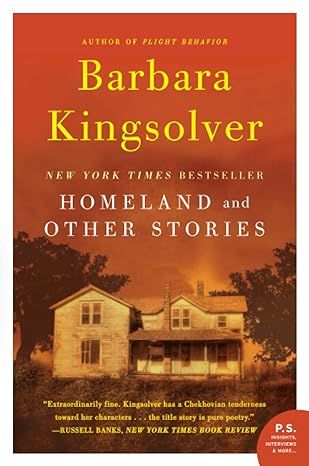
Homeland: And Other Stories
4.2
-
691
$5.24
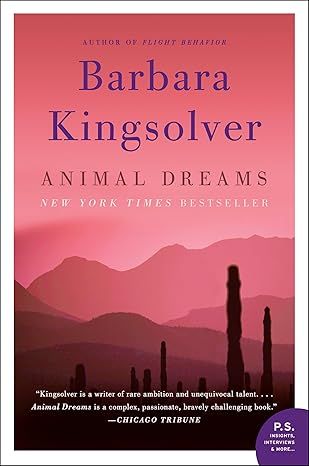
Animal Dreams: A Novel
4.4
-
2,888
$10.49
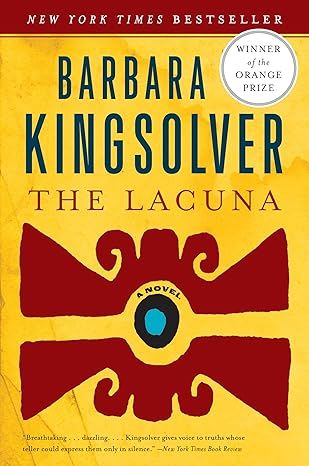
The Lacuna: A Novel (P.S.)
4.4
-
4,450
$1.77
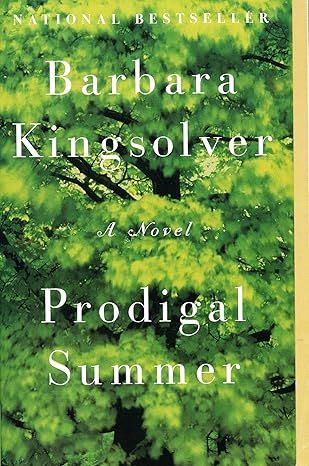
Prodigal Summer: A Novel
4.4
-
6,309
$8.99
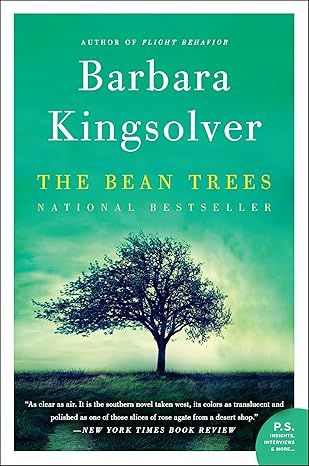
The Bean Trees Anniversary Edition: A Novel
4.4
-
11,504
$2.41
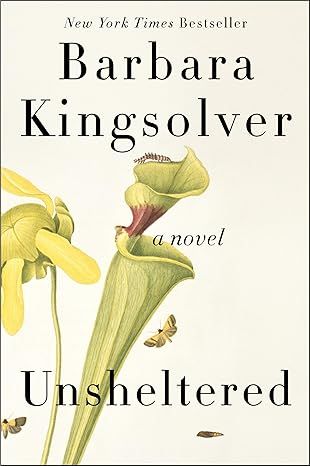
Unsheltered: A Novel
4.2
-
12,750
$5.24
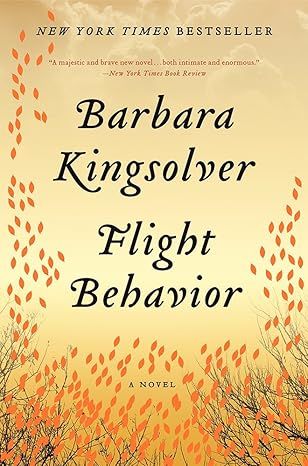
Flight Behavior: A Novel
4.3
-
9,479
$1.84
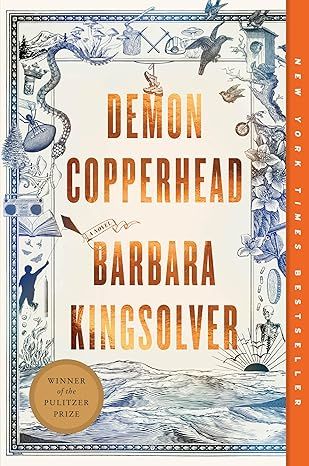
Demon Copperhead: A Novel
4.6
-
110,129
$16.99

The Poisonwood Bible: A Novel
4.5
-
16,256
$12.69
Best Sellers

The Tuscan Child
4.2
-
100,022
$8.39

The Thursday Murder Club: A Novel (A Thursday Murder Club Mystery)
4.3
-
155,575
$6.33

Sapiens: A Brief History of Humankind
4.6
-
140,302
$13.49

The Butterfly Garden (The Collector, 1)
4.3
-
88,556
$9.59

Things We Hide from the Light (Knockemout Series, 2)
4.4
-
94,890
$11.66

The Last Thing He Told Me: A Novel
4.3
-
154,085
$2.99

The Perfect Marriage: A Completely Gripping Psychological Suspense
4.3
-
143,196
$9.47

The Coworker
4.1
-
80,003
$13.48

First Lie Wins: A Novel (Random House Large Print)
4.3
-
54,062
$14.99

Mile High (Windy City Series Book 1)
4.4
-
59,745
$16.19

Layla
4.2
-
107,613
$8.99

The Locked Door
4.4
-
94,673
$8.53
